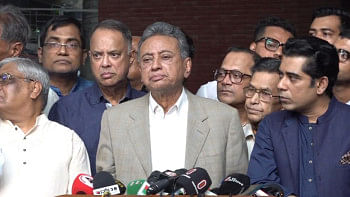Boost diplomatic efforts keeping regional interest in mind
Bangladesh needs to strengthen its diplomatic efforts to end the Rohingya crisis with taking into account the region's geo-political perspective, experts said at a symposium yesterday.
Terming the Rohingya crisis a global issue, the experts said the rivalry between regional powers has to be taken into consideration too as their interest in the region is the deciding factor in resolving the crisis.
Bangladesh has so far gained very little in the diplomatic arena as several countries including China and India have sided with Myanmar over the issue, which should be dealt aptly, said the experts, comprising former ambassadors, researchers, and academics.
They were speaking at a symposium at Bangladesh Institute of Law and International Affairs (BILIA) in the capital.
BILIA organised the symposium on “The Rohingya Influx and the Changing Scenario: Options and Challenges for Bangladesh”, where four papers shedding light on different perspectives of the ongoing Rohingya crisis were presented.
More than 620,000 Rohingyas have fled Myanmar's Rakhine State and taken shelter in different registered and makeshift refugee camps in Bangladesh since the latest atrocity began on August 25.
Presenting a paper on “The Statelessness of the Rohingyas in Myanmar: Is it beyond Remedy?”, Maj Gen (retd) Anup Kumar Chakma, former ambassador to the Republic of Union of Myanmar, said the issue of statelessness of Rohingyas needed to be resolved not only through emphasising bilateral efforts but also through understanding the regional relations.
The Rohingya issue needed to be resolved for the sake of Bangladesh-Myanmar bilateral relationship as well as for the interests of all countries including China and India, he said.
He noted that Rohingyas living in other regions in Myanmar are easily becoming its citizen using the country's existing citizenship law. Why those living in Rakhine state have failed to do so is needed to be understood, he said.
“The remedy lies in implementation of recommendations of the Kofi Annan Commission report…,” he added.
Saying that old crisis has resurfaced time and time again, Prof Delwar Hossain of international relations (IR) department of Dhaka University said rivalry between big countries like China and India has to be taken into consideration as their interest in the region is determinant to resolving the crisis.
Dominance of geo-economics, political economy and connectivity have to be understood as India has strongly supported Myanmar over Rohingya crisis bringing to the fore the terrorism issue, while China has its “Belt and Road” initiative in the region, said Prof Delwar.
“There is a kind of Myanmar-centrism in regional politics which made them strong,” he added.
Brig Gen (retd) Shafat Ahmed, a researcher on Myanmar issues, said the Southeastern country has been showing an indifferent attitude towards Bangladesh while diplomacy with taking help of friendly countries will be required to soften the relationship.
He stressed the need for taking a long-term plan to deal with the Rohingya crisis.
Prof Lailufar Yasmin, teacher of IR department of DU, said although locals warmly welcomed the Rohingyas, the former is now facing different problems to host them.
Gonoshasthya Kendra founder Dr Zafrullah Chowdhury said Bangladesh has failed and become friendless in the diplomatic process of resolving the Rohingya crisis.
Chairing and moderating the symposium, Prof Akmal Hussain, former chairman of IR department of DU, said Bangladesh has failed to make its long-term allies like India and China and regional countries Nepal, Bhutan and Sri Lanka, understand the issue.
Questions should be raised about Bangladesh's diplomacy and its effectiveness, he said.

 For all latest news, follow The Daily Star's Google News channel.
For all latest news, follow The Daily Star's Google News channel. 



Comments